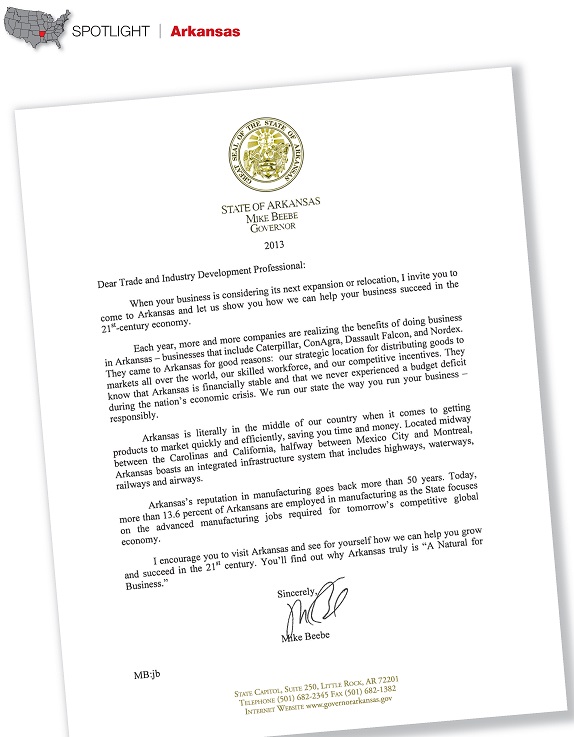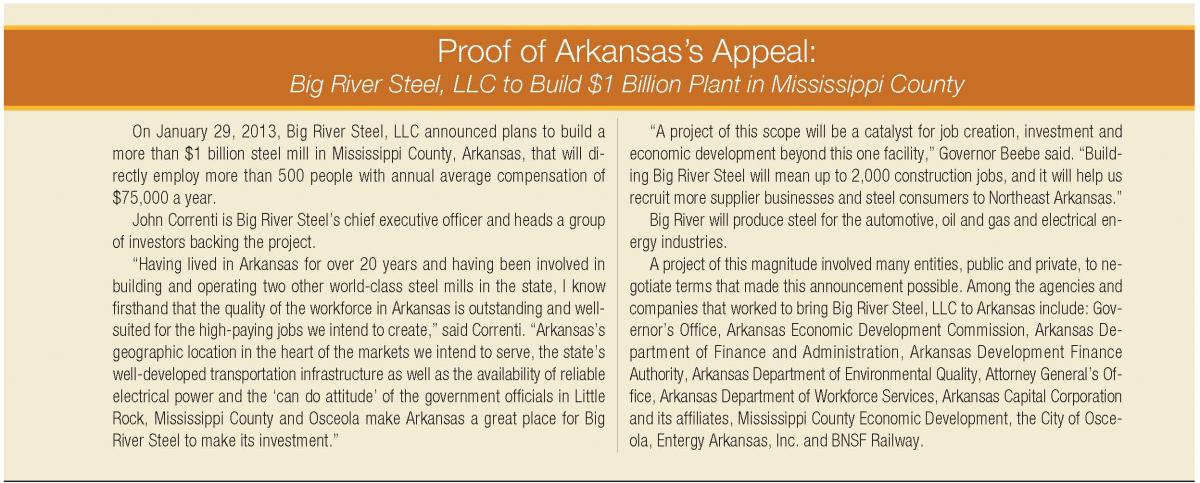

Arkansas’s central location, favorable business climate and skilled workforce combine to make an ideal place in North America for manufacturers.
Located in the center of America’s heartland, Arkansas has everything a business needs to succeed in the 21st century global marketplace. Goods can be easily and efficiently shipped throughout the United States and the world. Arkansas is halfway between the Carolinas and California, halfway between Mexico City and Montreal, and in the middle of an integrated infrastructure system.
When shipping on land, Interstate 40 runs from North Carolina on the east to California on the west and runs straight through the middle of Arkansas. Interstate 30 provides easy access to markets and ports in the southwest, including Texas and Mexico. There is also Arkansas’s state-of-the-art railroad infrastructure comprising three Class I systems.
 If other modes of distribution are preferred, there are two major commercial airports in Central and Northwest Arkansas as well as the commercial passenger service available at six regional airports throughout the state. And, a network of water transportation along the Arkansas River contains ports in Little Rock, North Little Rock, Pine Bluff and Fort Smith, in addition to Mississippi River terminals in Osceola, West Memphis and McGehee.
If other modes of distribution are preferred, there are two major commercial airports in Central and Northwest Arkansas as well as the commercial passenger service available at six regional airports throughout the state. And, a network of water transportation along the Arkansas River contains ports in Little Rock, North Little Rock, Pine Bluff and Fort Smith, in addition to Mississippi River terminals in Osceola, West Memphis and McGehee.
This infrastructure system ensures that goods are delivered around the world in a timely, efficient, cost-effective manner saving companies time and money.
A logistics advantage is one of the reasons world-class manufacturers continue to locate or expand facilities in Arkansas. Caterpillar, Nestlé, Firestone and Nordex are among the companies manufacturing products in Arkansas.
Another great advantage to doing business in Arkansas is its stable economy. Arkansas has avoided large cuts in services and tax increases while achieving more than a half-billion dollars in tax relief in the past five years. Arkansas’s per capita income continues to rise, and its unemployment levels consistently remain below the national average. The American Legislative Exchange Council has ranked Arkansas tenth in economic competitiveness and eleventh in economic outlook. Arkansas’s cost of doing business was ranked second-lowest in the United States in CNBC’s “Top States for Business” report in 2012. Arkansas ranks among the top-10 states in clean technology jobs and several of its metropolitan areas rank among the top locations for business and careers
Arkansas is rich in people with a strong work ethic and available training for whatever the need. Employers throughout the state consistently give favorable ratings to Arkansas workers for their work ethic, skills, productivity and low turnover rates. Arkansas’s labor force is nearly 1.5 million strong and projected to grow by four percent by 2015.
More than 13.6 percent of Arkansas’s workforce is employed in manufacturing. Sectors such as automotive, food processing and aerospace continue to grow. Aerospace was Arkansas’s largest export in 2012, totaling approximately $1.8 billion. Aerospace leaders such as Dassault Falcon, General Dynamics and Aerojet have facilities in Arkansas.
In Arkansas, there is a strong connection between its education system and economic development efforts. New and expanding manufacturers in the state work closely with its higher education institutions to create tailored programs and training courses. Thirty-four public colleges and universities, two technical institutes and 11 independent colleges and universities are located throughout the state.
As manufacturing technology quickly changes, so do the specific skill sets needed by individual companies. The Career Readiness Certificate program, which provides information on the applicant’s skills in mathematics, reading and locating information, is offered to businesses at no cost. This is one of many tools offered to Arkansas employers to ensure they have the workforce needed to succeed.
In addition, STEM Works is a pilot education/training program created through Arkansas Governor Mike Beebe and his Workforce Cabinet. The initiative focuses on science, technology, engineering and math (STEM) education in high schools and universities in an effort to prepare the state’s workforce for emerging high-tech fields.
Arkansas’s incentives are nationally competitive, understandable and easy to use. Arkansas works with new and existing industries and will focus on each business's specific needs to provide a tailored incentive proposal for the project. Arkansas considers a variety of factors including business/industrial capital investment, payroll, workforce development and community support in preparing incentive proposals.
Businesses that plant roots in Arkansas will be joining its four homegrown Fortune 500 companies: Dillard's, Murphy Oil, Tyson Foods and Wal-Mart Stores – the world’s largest retailer. They are among more than 100 Fortune 500 parent firms with more than 2,300 facilities in Arkansas.

Related Agencies
- Greater Osceola Partnership for Economic Prosperity GO-PEP
- Metro Little Rock Chamber
- Economic Development Alliance for Jefferson County, Arkansas
- Arkansas Economic Development Commission
- Great River Economic Development Foundation
- Arkansas Valley Alliance for Economic Development
- Arkansas Electric Cooperative Corporation
- The Southwest Arkansas Water District

